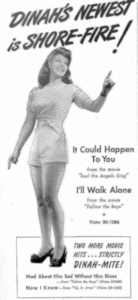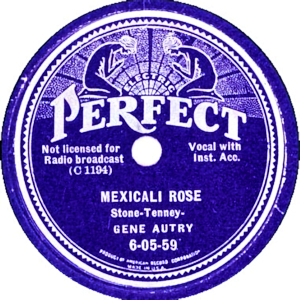Related Research Articles
"How High the Moon" is a jazz standard with lyrics by Nancy Hamilton and music by Morgan Lewis. It was first featured in the 1940 Broadway revue Two for the Show, where it was sung by Alfred Drake and Frances Comstock. In Two for the Show, this was a rare serious moment in an otherwise humorous revue.
"Why Don't You Believe Me?" is a popular song written by Lew Douglas, King Laney, and Roy Rodde and published in 1952.
"Love Me or Leave Me" is a popular song written in 1928 by Walter Donaldson with lyrics by Gus Kahn. The song was introduced in the Broadway musical comedy Whoopee!, which opened in December 1928. Ruth Etting's performance of the song was so popular that she was also given the song to sing in the play Simple Simon, which opened in February 1930.

"Back in Your Own Back Yard" is a popular song. Officially the credits show it as written by Al Jolson, Billy Rose, and Dave Dreyer; in fact, Billy Rose was exclusively a lyricist, Dreyer a composer, and Al Jolson a performer who was often given credits so he could earn some more money, so the actual apportionment of the credits would be likely to be music by Dreyer, lyrics by Rose, and possibly some small contribution by Jolson.
"(Why Did I Tell You I Was Going To) Shanghai" is a popular song written by Bob Hilliard (lyricist) and Milton De Lugg (composer).
"Wake the Town and Tell the People" is a popular song with music by Jerry Livingston and lyrics by Sammy Gallop, published in 1955. This song is a wedding day number complete with the chorus imitating the sound of wedding bells, as well as the sounds of the real chimes.
This is a list of notable events in country music that took place in 1947.
This is a list of notable events in country music that took place in the year 1945.
This is a list of notable events in country music that took place in the year 1943.
"Imagination" is a popular song with music written by Jimmy Van Heusen and the lyrics by Johnny Burke. The song was first published in 1940. The two best-selling versions were recorded by the orchestras of Glenn Miller and Tommy Dorsey in 1940.
"It's Been a Long, Long Time" is a big band-era song that was a hit at the end of World War II, with music by Jule Styne and lyrics by Sammy Cahn.
"I Had the Craziest Dream" is a popular song which was published in 1942. The music was written by Harry Warren, the lyrics by Mack Gordon.

"The Nearness of You" is a popular song written in 1937 by Hoagy Carmichael (1899-1981), with lyrics by Ned Washington (1901-1976). Intended for an unproduced Paramount Pictures film titled Romance In The Rough, the studio's publishing division Famous Music reregistered and published the song three years later in 1940. It was first recorded by Chick Bullock (1898-1981) and his Orchestra on Vocalion. Despite numerous accounts to the contrary, the song was never scheduled for and does not appear in the production of the 1938 Paramount film Romance in the Dark.

"I'll Walk Alone" is a 1944 popular song with music by Jule Styne and lyrics by Sammy Cahn. The song was written for the 1944 musical film Follow the Boys, in which it was sung by Dinah Shore, and was nominated for the Academy Award for Best Original Song but lost to “Swinging on a Star”. Shore recorded the song in March as a single, which became her first #1 hit on the Billboard charts.
"All or Nothing at All" is a song composed in 1939 by Arthur Altman, with lyrics by Jack Lawrence.
"You'd Be So Nice to Come Home To" is a popular song written by Cole Porter for the 1943 film Something to Shout About, where it was introduced by Janet Blair and Don Ameche. The song was nominated for the Academy Award for Best Original Song in 1943 but lost to "You'll Never Know". It featured in The Fortune Cookie, a 1966 Billy Wilder movie, sung by Judi West.

"Mexicali Rose" is a popular song composed by bandleader and pianist Jack Breckenridge Tenney in the early 1920s, when he and his seven piece orchestra played the hotels and clubs of the Calexico and Mexicali border. The song became a hit in the mid-1930s, thanks to Gene Autry and Bing Crosby, around the same time that Tenney became a lawyer and was elected to the California State Assembly. Tenney was later appointed to head of the California Senate Factfinding Subcommittee on Un-American Activities.

"I'm Always Chasing Rainbows" is a popular Vaudeville song. The music is credited to Harry Carroll, but the melody is adapted from Fantaisie-Impromptu by Frédéric Chopin. The lyrics were written by Joseph McCarthy, and the song was published in 1917. It was introduced in the Broadway show Oh, Look! which opened in March 1918. The song was sung in the show by the Dolly Sisters. Judy Garland sang it in the 1941 film Ziegfeld Girl. It was subsequently sung by Jack Oakie in the 1944 film The Merry Monahans and was again featured in the 1945 film The Dolly Sisters (1945), where it was sung by John Payne. It was also included for part of the run of the 1973 revival of Irene. Additionally, the pre-chorus would not have been included until later covers in the 1940s, where the song would gain its iconic libretti.
For music from an individual year in the 1940s, go to 40 | 41 | 42 | 43 | 44 | 45 | 46 | 47 | 48 | 49
"The Lamplighter's Serenade" is a song written by Hoagy Carmichael (music) and Paul Francis Webster (lyrics). The construction of the song was unusual and did not conform to the normal AABA pattern. Instead, Carmichael used an ABA format that proved most effective.
References
- 1 2 3 4 "COLUMBIA 78rpm numerical listing discography: 36500 - 37000". www.78discography.com. Retrieved 2022-03-01.
- 1 2 3 Library of Congress. Copyright Office. (1942). Catalog of Copyright Entries 1942 2 Music New Series Vol 37 Pt 3. United States Copyright Office. U.S. Govt. Print. Off.
- ↑ Browne, Ray Broadus; Ambrosetti, Ronald J. (1993). Continuities in Popular Culture: The Present in the Past & the Past in the Present and Future. Popular Press. ISBN 9780879725938.
- 1 2 Gilliland, John (1994). Pop Chronicles the 40s: The Lively Story of Pop Music in the 40s (audiobook). ISBN 978-1-55935-147-8. OCLC 31611854. Tape 1, side A.
- ↑ "COLUMBIA 78rpm numerical listing discography: 36500 - 37000". www.78discography.com. Retrieved 2022-03-01.
- ↑ Whitburn, Joel (2004). Top R&B/Hip-Hop Singles: 1942-2004. Record Research. p. 291.
- ↑ Al Hirt, They're Playing Our Song at Discogs. Retrieved April 13, 2013.